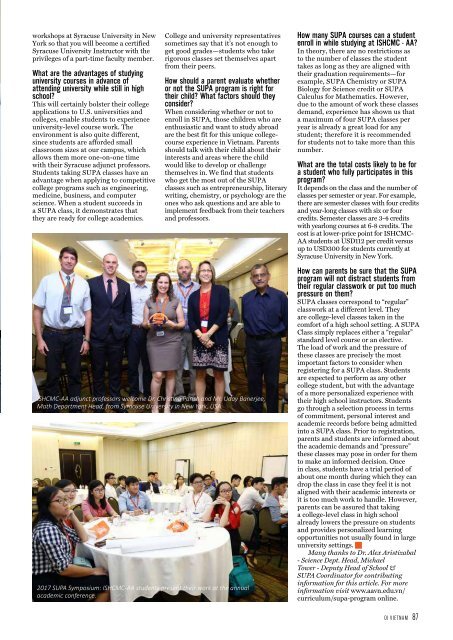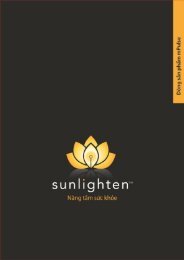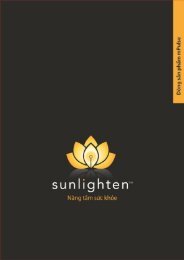Oi Magazine reviews - Aura & Co. Infrared Sauna Studio,Thao Dien... "Heavenly Heat"
Create successful ePaper yourself
Turn your PDF publications into a flip-book with our unique Google optimized e-Paper software.
workshops at Syracuse University in New<br />
York so that you will become a certified<br />
Syracuse University Instructor with the<br />
privileges of a part-time faculty member.<br />
What are the advantages of studying<br />
university courses in advance of<br />
attending university while still in high<br />
school?<br />
This will certainly bolster their college<br />
applications to U.S. universities and<br />
colleges, enable students to experience<br />
university-level course work. The<br />
environment is also quite different,<br />
since students are afforded small<br />
classroom sizes at our campus, which<br />
allows them more one-on-one time<br />
with their Syracuse adjunct professors.<br />
Students taking SUPA classes have an<br />
advantage when applying to competitive<br />
college programs such as engineering,<br />
medicine, business, and computer<br />
science. When a student succeeds in<br />
a SUPA class, it demonstrates that<br />
they are ready for college academics.<br />
<strong>Co</strong>llege and university representatives<br />
sometimes say that it’s not enough to<br />
get good grades—students who take<br />
rigorous classes set themselves apart<br />
from their peers.<br />
How should a parent evaluate whether<br />
or not the SUPA program is right for<br />
their child? What factors should they<br />
consider?<br />
When considering whether or not to<br />
enroll in SUPA, those children who are<br />
enthusiastic and want to study abroad<br />
are the best fit for this unique collegecourse<br />
experience in Vietnam. Parents<br />
should talk with their child about their<br />
interests and areas where the child<br />
would like to develop or challenge<br />
themselves in. We find that students<br />
who get the most out of the SUPA<br />
classes such as entrepreneurship, literary<br />
writing, chemistry, or psychology are the<br />
ones who ask questions and are able to<br />
implement feedback from their teachers<br />
and professors.<br />
ISHCMC-AA adjunct professors welcome Dr. Christina Parish and Mr. Uday Banerjee,<br />
Math Department Head, from Syracuse University in New York, USA.<br />
2017 SUPA Symposium: ISHCMC-AA students present their work at the annual<br />
academic conference.<br />
How many SUPA courses can a student<br />
enroll in while studying at ISHCMC - AA?<br />
In theory, there are no restrictions as<br />
to the number of classes the student<br />
takes as long as they are aligned with<br />
their graduation requirements—for<br />
example, SUPA Chemistry or SUPA<br />
Biology for Science credit or SUPA<br />
Calculus for Mathematics. However,<br />
due to the amount of work these classes<br />
demand, experience has shown us that<br />
a maximum of four SUPA classes per<br />
year is already a great load for any<br />
student; therefore it is recommended<br />
for students not to take more than this<br />
number.<br />
What are the total costs likely to be for<br />
a student who fully participates in this<br />
program?<br />
It depends on the class and the number of<br />
classes per semester or year. For example,<br />
there are semester classes with four credits<br />
and year-long classes with six or four<br />
credits. Semester classes are 3-4 credits<br />
with yearlong courses at 6-8 credits. The<br />
cost is at lower-price point for ISHCMC-<br />
AA students at USD112 per credit versus<br />
up to USD300 for students currently at<br />
Syracuse University in New York.<br />
How can parents be sure that the SUPA<br />
program will not distract students from<br />
their regular classwork or put too much<br />
pressure on them?<br />
SUPA classes correspond to “regular”<br />
classwork at a different level. They<br />
are college-level classes taken in the<br />
comfort of a high school setting. A SUPA<br />
Class simply replaces either a “regular”<br />
standard level course or an elective.<br />
The load of work and the pressure of<br />
these classes are precisely the most<br />
important factors to consider when<br />
registering for a SUPA class. Students<br />
are expected to perform as any other<br />
college student, but with the advantage<br />
of a more personalized experience with<br />
their high school instructors. Students<br />
go through a selection process in terms<br />
of commitment, personal interest and<br />
academic records before being admitted<br />
into a SUPA class. Prior to registration,<br />
parents and students are informed about<br />
the academic demands and “pressure”<br />
these classes may pose in order for them<br />
to make an informed decision. Once<br />
in class, students have a trial period of<br />
about one month during which they can<br />
drop the class in case they feel it is not<br />
aligned with their academic interests or<br />
it is too much work to handle. However,<br />
parents can be assured that taking<br />
a college-level class in high school<br />
already lowers the pressure on students<br />
and provides personalized learning<br />
opportunities not usually found in large<br />
university settings. <br />
Many thanks to Dr. Alex Aristizabal<br />
- Science Dept. Head, Michael<br />
Tower - Deputy Head of School &<br />
SUPA <strong>Co</strong>ordinator for contributing<br />
information for this article. For more<br />
information visit www.aavn.edu.vn/<br />
curriculum/supa-program online.<br />
OI VIETNAM<br />
87





